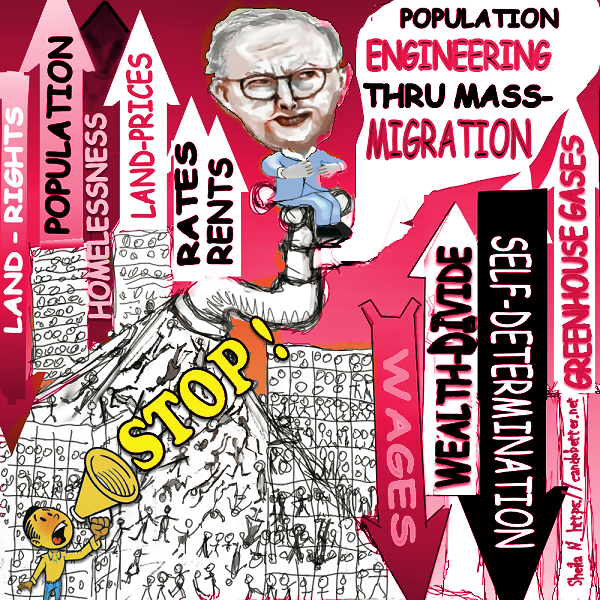 In the article the writer questions the whole idea of governments making top-down decisions about the size of a country's population.
In the article the writer questions the whole idea of governments making top-down decisions about the size of a country's population.
A question that often comes up when discussion population related matter is, "What should the population be?" or "What level of immigration/growth do you think is suitable?". I don't have an answer to that question, and I don't intend to provide one.
At issue: Is population size really a matter for the state?
In "What a Population Policy means to a People" we discussed the dangers of having a population policy. A government which imposes a population policy is doing more than simply deciding how many people exist within the geographic areas that it governs, its also making a determination on the composition of the population, which becomes unavoidable when any other population target than that which would have been arrived at naturally must involve. As we are subject to population policies which seek to increase the population, this means that the immigration program must unavoidably act to the detriment of the original populations, diminishing their representation and power in order to achieve an abstract target. The issue isn't whether a government decides to increase the population, decrease it, or keep it constant, the issue is the belief that the government has a right to decide this matter in the first place. The issue is the belief that population size is a matter for the state, and like interest rates, tax rates, tariffs and the number of taxi licences issues, is a matter for a bureaucracy to decide.
Also flawed is the idea that a government can set population targets democratically, if it puts forward its policies before the electorate and allows the population to vote for one which they prefer. This assumes that there are sufficient options put before the public, that the parties are given equal treatment in the media, and that the population vote according to their own interests and reason, instead of how the establishment pushes them with scaremongering and propaganda. This isn't what we observe, so if our democracy is anything less than perfect in offering a full spectrum of choices, each of which stand a change, we can't rely on a vote. But even if we were to vote, we still have a population policy in the first place. We still legitimise the right of the state to set a policy, which can very quickly and easily turn pathological. Even a sensible population policy doesn't solve this problem, as we are still ceding to the state the right to manipulate us, to displace and diminish us, or otherwise make judgements on the suitability of us as the population of the nation.
People vote democratically with their wombs
The alternative is to allow the population size to be set by the people by the most democratic means available, the individual reproductive choices that we all make. With cheap and readily available birth control, we more or less are capable of choosing or ourselves how many children we have. The birthrate of the nation is therefore nothing more than the accumulative decision making of all people manifesting itself. If people think the population is too low, they will choose to have more children, and the population will increase. If they think the population is large enough, and we don't need growth, they'll have fewer children and the population will stabilise or even reduce. Below replacement birth rates in the Western world are an indication that the people have voted with their ova and sperm, and don't perceive the need for a 'populate or perish' mindset. [This idea of below replacement is abused a lot by our masters. I suggest removing the 'The' which makes it sound like a widely established phenomenon, and just having 'Below replacement' which doesn't suggest such statistical dominance.]
So what should be the role of the state?
So where does the state fit in? It is the role of political and economic leaders not to force a population outcome that they desire or which suits their own objectives, but adapt that that chosen by the people. The low birthrate is only an issue because our political and economic ruling class cannot handle or adapt to this new reality. We have growth forced upon us because the dominant political class refuses to adapt, refuses to implement new solutions, refuses to reform and instead asks us to adapt and even to destroy ourselves, for their own security and posterity. In short, if a stable or falling population is a problem for the political and economic ruling class, then it is the ruling class which is deficient, which has the problem, not the people.
Immigration rate should be in line with birth rate
Immigration therefore has to fit in with this. As population policy is largely implemented through the immigration floodgates, and immigration is used to override the peoples' wishes, immigration policy therefore has to be synchronised with birthrate. Therefore, a sensible immigration policy would be in-line with the birthrate, and not seek to counteract it. Ideally, it the net population intake through immigration would be a function of the total birthrate. If the birthrate rises, then the immigration rate increases and conversely, if the birthrate lowers, then the immigration rate lowers. Immigration could be set at a fixed percentage of total births, where it represents at most, a small percentage. In Australia at the moment, immigration account for more than half of all additions, which is way to high. A better figure would be about 10%, allowing some people to enter Australia if they need to, but not being significant enough to override Australias chosen birthrate.
For those concerned about future population growth, such a stance should be acceptable, because birthrates being just below replacement in Australia (1.93 births per woman as of July 2016),[1] this should act as a limiting factor for future growth. Further measures can be taken to lower the birthrate by removing government incentives.
For Australia's pattern up to 2013 http://www.abs.gov.au/ausstats/[email protected]/Previousproducts/3301.0Main%20Features42013?opendocument&tabname=Summary&prodno=3301.0&issue=2013&num=&view=
 The video is 33 minutes long and documents scenes at the Melbourne March for Australia, starting one hour ahead, to give an idea of how things began, then you get an impression, half-way of how the crowds built up to standing-room only, then how they stretched as far as the eye could see.
The video is 33 minutes long and documents scenes at the Melbourne March for Australia, starting one hour ahead, to give an idea of how things began, then you get an impression, half-way of how the crowds built up to standing-room only, then how they stretched as far as the eye could see.
 Transcript from Clayton Morris of Redacted Inc's discussion with Neil Oliver, former BBC archaeological history commentator, who shares his theories about immigration and progressive ideologies in Scotland and elsewhere. He says the mainstream media which formerly promoted him, now marginalizes him for his opinions. He finds solace in the support of interesting and courageous individuals, who are grateful for his speaking out.
Transcript from Clayton Morris of Redacted Inc's discussion with Neil Oliver, former BBC archaeological history commentator, who shares his theories about immigration and progressive ideologies in Scotland and elsewhere. He says the mainstream media which formerly promoted him, now marginalizes him for his opinions. He finds solace in the support of interesting and courageous individuals, who are grateful for his speaking out. Although Church of England clergy arrived with the first fleet and were appointed to manage social policy in Australia, including ongoing settlement via immigration, the Church of England seemed to concentrate less on independently building its own congregations and institutions than the Catholic Church.
Although Church of England clergy arrived with the first fleet and were appointed to manage social policy in Australia, including ongoing settlement via immigration, the Church of England seemed to concentrate less on independently building its own congregations and institutions than the Catholic Church. Grassroots advocacy group, Australians for Mental Health (AfMH) is calling for urgent and significant reform following a damning assessment found the national plan to improve mental health and prevent suicide is “not fit for purpose.”
Grassroots advocacy group, Australians for Mental Health (AfMH) is calling for urgent and significant reform following a damning assessment found the national plan to improve mental health and prevent suicide is “not fit for purpose.” Amid Australia's growing conflict over population numbers and democratic planning, we need ideas based on historical and social research, rather than shallow logistics pushed by technocrats. Familiar with these dynamics, I see the challenge of joining this debate with the depth it needs.
Amid Australia's growing conflict over population numbers and democratic planning, we need ideas based on historical and social research, rather than shallow logistics pushed by technocrats. Familiar with these dynamics, I see the challenge of joining this debate with the depth it needs. The Frankston Beach Association has expressed deep disappointment in Frankston City Council’s decision to discontinue the Kananook Creek Governance Group, saying that this decision, made by the new Council on Monday, 2 December 2024, reflects a concerning lack of transparency and consultation.
The Frankston Beach Association has expressed deep disappointment in Frankston City Council’s decision to discontinue the Kananook Creek Governance Group, saying that this decision, made by the new Council on Monday, 2 December 2024, reflects a concerning lack of transparency and consultation.  This discussion covers every important base on the push and pull factors for mass migration and the problems that ensue for the receiving populations on which it is imposed by elites. It is worth a library of books on the subject. Also, on Tommy Robinson, a surprising analysis.
This discussion covers every important base on the push and pull factors for mass migration and the problems that ensue for the receiving populations on which it is imposed by elites. It is worth a library of books on the subject. Also, on Tommy Robinson, a surprising analysis. Stop the Great Wall of Frankston and others call for people to come and join us at 11 am this Saturday on Kananook Boulevard at the Rear of Harbour site (next to rear of McDonalds).
Stop the Great Wall of Frankston and others call for people to come and join us at 11 am this Saturday on Kananook Boulevard at the Rear of Harbour site (next to rear of McDonalds). It's a relief to see Yemen use intelligence and a sense of humour to bring pressure on Israel and its backers' vicious attempts to obliterate Gaza-Palestine! Yemenis are now taking boatloads of tourists to sight-see on the Galaxy Leader, the part-Israeli-owned ship they captured on 19 November. You can also see them dancing in a line on its deck,
It's a relief to see Yemen use intelligence and a sense of humour to bring pressure on Israel and its backers' vicious attempts to obliterate Gaza-Palestine! Yemenis are now taking boatloads of tourists to sight-see on the Galaxy Leader, the part-Israeli-owned ship they captured on 19 November. You can also see them dancing in a line on its deck,  "Words fail to express our shock and horror with regard to the ongoing war in our land. We deeply mourn the death and suffering of all people because it is our firm conviction that all humans are made in God’s image. We are also profoundly troubled when the name of God is invoked to promote violence and religious national ideologies. Further, we watch with horror the way many Western Christians are offering unwavering support to Israel’s war against the people of Palestine."
"Words fail to express our shock and horror with regard to the ongoing war in our land. We deeply mourn the death and suffering of all people because it is our firm conviction that all humans are made in God’s image. We are also profoundly troubled when the name of God is invoked to promote violence and religious national ideologies. Further, we watch with horror the way many Western Christians are offering unwavering support to Israel’s war against the people of Palestine." Newman sets out to explain why a revolution occurred in France, but not England, using a multidisciplinary methodology. She investigates the origins of the French Revolution using demographic patterns, land-tenure and inheritance systems and comparative research.
Newman sets out to explain why a revolution occurred in France, but not England, using a multidisciplinary methodology. She investigates the origins of the French Revolution using demographic patterns, land-tenure and inheritance systems and comparative research. France prints colonial money for Burkina Faso, which is one of the poorest nations in the world, although it has gold and uranium. In return France demands 50% of everything Burkina Faso exports. Burkina Faso's uranium supplies 30% of French nuclear plant needs, but 80% of Burkina Fasoans have no electricity. Gold mined by child-labour mostly ends up in French state coffers. The French government wants the deposed president reinstated. So, is this a coup or a revolution?
France prints colonial money for Burkina Faso, which is one of the poorest nations in the world, although it has gold and uranium. In return France demands 50% of everything Burkina Faso exports. Burkina Faso's uranium supplies 30% of French nuclear plant needs, but 80% of Burkina Fasoans have no electricity. Gold mined by child-labour mostly ends up in French state coffers. The French government wants the deposed president reinstated. So, is this a coup or a revolution?


 The Stanley Plateau nestled in the foothills of the Victorian Alps, is fighting for the right to preserve its water resources from extraction by a company that transports the water to a plant in Albury, across the border in NSW, for bottling. The bottled water from Stanley and surrounding areas is for domestic and overseas distribution processed by a multi-national company. Stanley has commenced fund raising for the next stage of the Cue Springs Water Challenge - an appeal to the Victorian Court of Appeal. The website
The Stanley Plateau nestled in the foothills of the Victorian Alps, is fighting for the right to preserve its water resources from extraction by a company that transports the water to a plant in Albury, across the border in NSW, for bottling. The bottled water from Stanley and surrounding areas is for domestic and overseas distribution processed by a multi-national company. Stanley has commenced fund raising for the next stage of the Cue Springs Water Challenge - an appeal to the Victorian Court of Appeal. The website  In the article the writer questions the whole idea of governments making top-down decisions about the size of a country's population.
In the article the writer questions the whole idea of governments making top-down decisions about the size of a country's population.
Recent comments